GP Pulse 93: Croatian Entrepreneurs – Readiness to Change and New Ways of Doing Business
July 25, 2020 - What is the awareness of the new functioning of the market and the willingness for necessary changes?
One of the long-term goals of UGP is the development of entrepreneurial, proactive, and creative culture and mindset. We have identified the various training needs of our members, and with the development of the Association, this will undoubtedly become one of the most significant advantages. Given that we are facing a large-scale crisis in a global context, aside from focusing on short-term measures for the survival of companies, we wanted to turn to the changes that will be required in the medium or long term. Considering the unpredictability of the time ahead, it is necessary to strengthen the capabilities of entrepreneurs and their firms in several ways – through new knowledge, attitudes, relationships, values, and interests. To get as much information as possible about the entrepreneur's current activities related to the upcoming period, we asked them, "What are entrepreneurs doing with their business to prepare/adapt to the new circumstances?"
The most significant number of our members, 46% responded that they are optimizing current business processes and human resources, which is very logical and necessary. About 20% said they are developing new methods or remodeling old ones, while 3% is changing the customer pool, which is a slightly higher level of innovation, but the question remains, will this be enough? 11% of responders say they are changing the entire structure of the firm to adapt, and here we can add some just above 5% of those who say they are completely changing both the market and services and are turning to new deals. Relatively small, but not negligible 8% take the financial support and wait for the situation to normalize, and about 5% plan to close the company and transfer their business to another country.

These results leave room for moderate concern. Even though more than 60% of firms are making some changes, only 16% of them are considering the sharp turns that would be required in the worst-case scenario. Of course, it seems that this threatens to disappear more than 13% of firms that passively wait for the situation to develop and hope or leave the country.
Given this situation, it was also logical to check what entrepreneurs thought might lead to their launch and help them start looking for new business models and faster changes that would be required. We got polarizing but very interesting answers to this question: more than 57% understand that measures are not a long-term solution and that they should be canceled relatively quickly (in a matter of months) because people avoid changes until they are forced to. The second answer is given by 23% of respondents who think the opposite – that it is necessary to extend existing measures as long as possible to get time for the required transformation. We believe this is a good indicator of how awareness is growing. It's becoming clear that dependence on government subsidies can't last and that entrepreneurs will have to be even more entrepreneurial.

Finally, we asked our members, "How much time and energy have you invested in developing new ideas and ways of doing business over the past few months?"
About 55% said that they are actively working on new business opportunities and that this is their primary focus, which we think is the right answer. Just above 26% admitted that they did very little to deal with it and mostly focused on crisis and survival. A moderate 14% have adapted somewhat, but plan to continue working on it, and again 3% say their option is to go to another country.
At a time when the necessary reforms are expected to be implemented by the new Government, and in a situation that has already caused the departure of some foreign firms (the latest case is Meggle), it is clear that the fight for the economy and maintaining the quality of life will be tough and will require complete solutions. As a country, we must become more competitive, the four postulates of UGP must be implemented to facilitate business, reduce bureaucracy and administration, ensure that justice is better and faster met, and control all costs well while avoiding clientelism. On the other hand, this will also not be enough if entrepreneurs themselves do not take huge steps and change the strategies and ways of doing business, and some of the industries in which they work. Because of this, UGP supports the lifelong education and progress of the entrepreneurs, which it will also actively work on, hoping to create a positive entrepreneurial climate in the country as soon as possible. If that does not happen, and from these figures, you can calculate black scenarios and a drop in GDP, which will be estimated in tens of percentage points.
***
The GLAS PODUZETNIKA Initiative started as a citizens' self-organized group, most of which are small entrepreneurs, after the announcement of the first set of Government's measures, which the organizers deemed insufficient. The Initiative assembled more than 100,000 entrepreneurs, small business owners, self-employed, and the employees in the private sector in less than 15 days, drawing the media spotlight with its uncompromising requests and appearances. Considering this, GLAS PODUZETNIKA positioned itself as a relevant factor in public discussions aimed to determine Croatia's new economic direction. Its position was also confirmed by the Government of the Republic of Croatia, which has included some of the Initiative's suggestions in the second set of economic measures, thus confirming Initiative's undeniable influence. At the request of the Initiative's members, the GLAS PODUZETNIKA Association was established, gathering more than 12,000 members. More than 200,000 Croatian citizens support the Association.
For the latest on the Glas Poduzetnika initiative, follow the dedicated TCN section.
Entrepreneurs Call for Deferment of Taxes and Contributions Until September
ZAGREB, July 17, 2020 - The Voice of Entrepreneurs association (UGP) believes that it is necessary to write off income taxes and contributions until at least September, warning that rules are virtually being changed on a daily basis which does not contribute to stabilising business operations.
"We consider that tax and contribution write-offs should continue until September at least, particularly since this affects the most vulnerable companies in tourism, hospitality, transport and similar sectors," the head of the UGP, Hrvoje Bujas, told Hina.
"We see that the rules and concepts are being changed practically every day which, along with the uncertainty caused by the pandemic and two-month lockdown of business operations, is certainly not good for any attempt to stabilise and adapt business," said Bujas.
Finance Minister Zdravko Maric said on Thursday that more than 90,000 taxpayers had requested a deferment or write-off of their tax liabilities which amounted to a total of HRK 5.3 billion, saying that these measures referred to April, May, and June and would not be extended.
Entrepreneurs Do Not Trust Croatian Justice System
June 30 - UGP conducted several surveys among its members on the topic of the justice system. The results are devastating, but unfortunately, expected. The slow and inefficient judicial system is also, according to entrepreneurs, one of the main problems of Croatian society. The UGP believes that legal reform should be one of the first reforms of the new Government.
One of the UGP's postulates is #morejustice, and one of the reforms we requested from the Croatian Government applies to the Croatian justice system. Even though the trust in the justice system is generally on a low level, it seems like it is also a more significant stumbling block for entrepreneurs and a barrier in the business.
For this reason, we asked entrepreneurs more questions to process the topic better and try to find out where all the reasons for such deep dissatisfaction lie.
The first question was, "What is the role of the judicial system in the exercise of entrepreneurs' rights?" Only 0.5% of respondents think that the system helps significantly, as it should. The same number of respondents think exactly the opposite: the justice system substantially makes things worse, 0.5%. Very few, 1.4% think that the justice system moderately helps, making the overall positive perception under 2%. 17.7% think that the justice system does not help entrepreneurs. The largest category, 80% of respondents say, "Come on, please..." which suggests that the condition is so bad that there is no point in answering the question on any positive impact. This level of resignation is the first sign to raise the alarm.

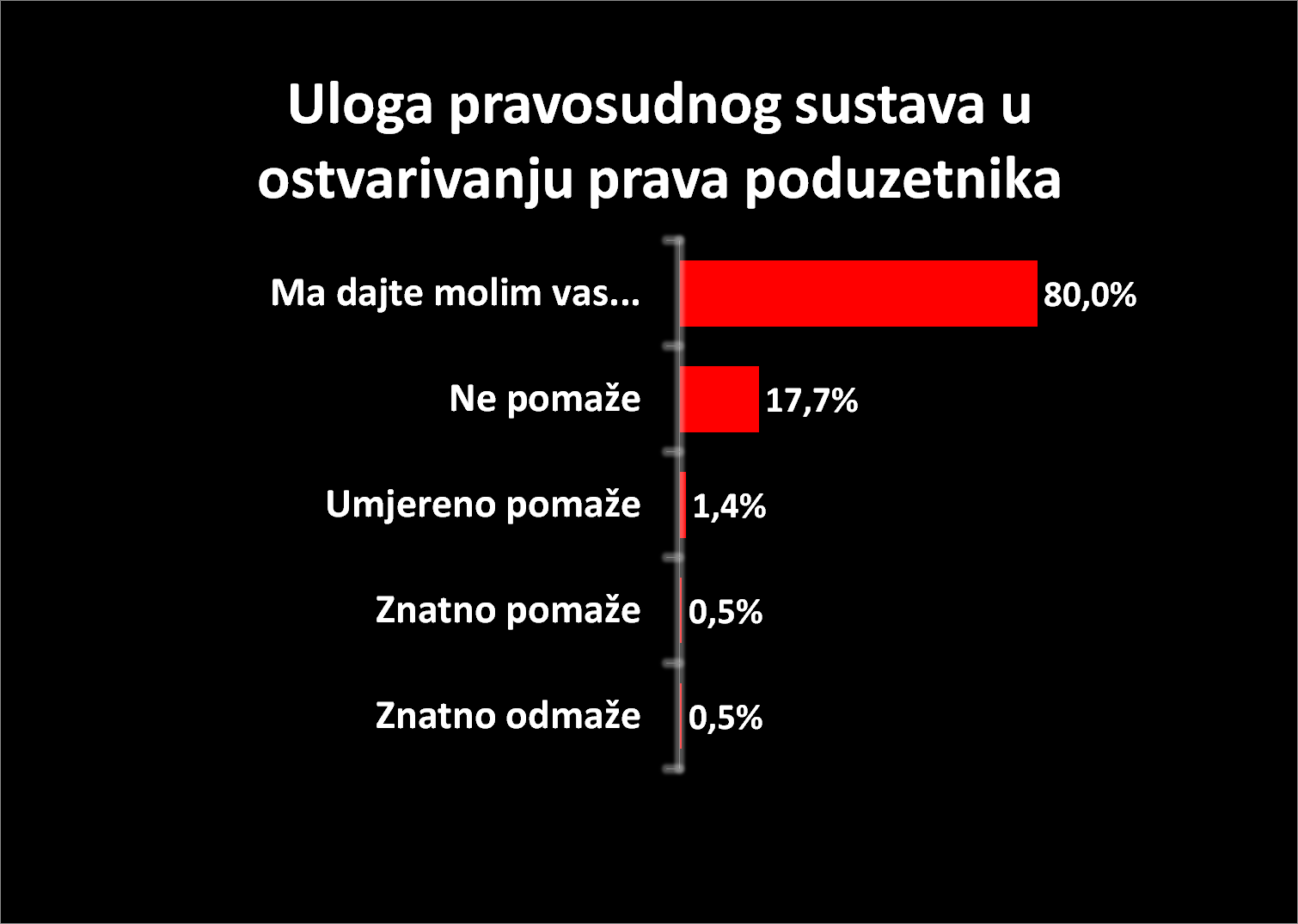
The second question was about the length of litigations, given that both the viability of the business and the survival of the firm can often depend on it. We received responses about the duration of legal proceedings that our members conducted or are conducting: only 2.2% say the proceedings lasted under two years, which we consider a reasonable deadline. Another 5.9% said that the procedures lasted for a somewhat acceptable 2 to 5 years. The most significant number of votes — 47.8% — went to the answer "more than five years." This time range doesn't make much sense in the business context. Up to 33% say that the procedures lasted more than ten years, which is entirely unacceptable.
The latest information is that almost 11% say they had or still have proceedings going on for more than 20 years! We don't even know how to comment on this last part.
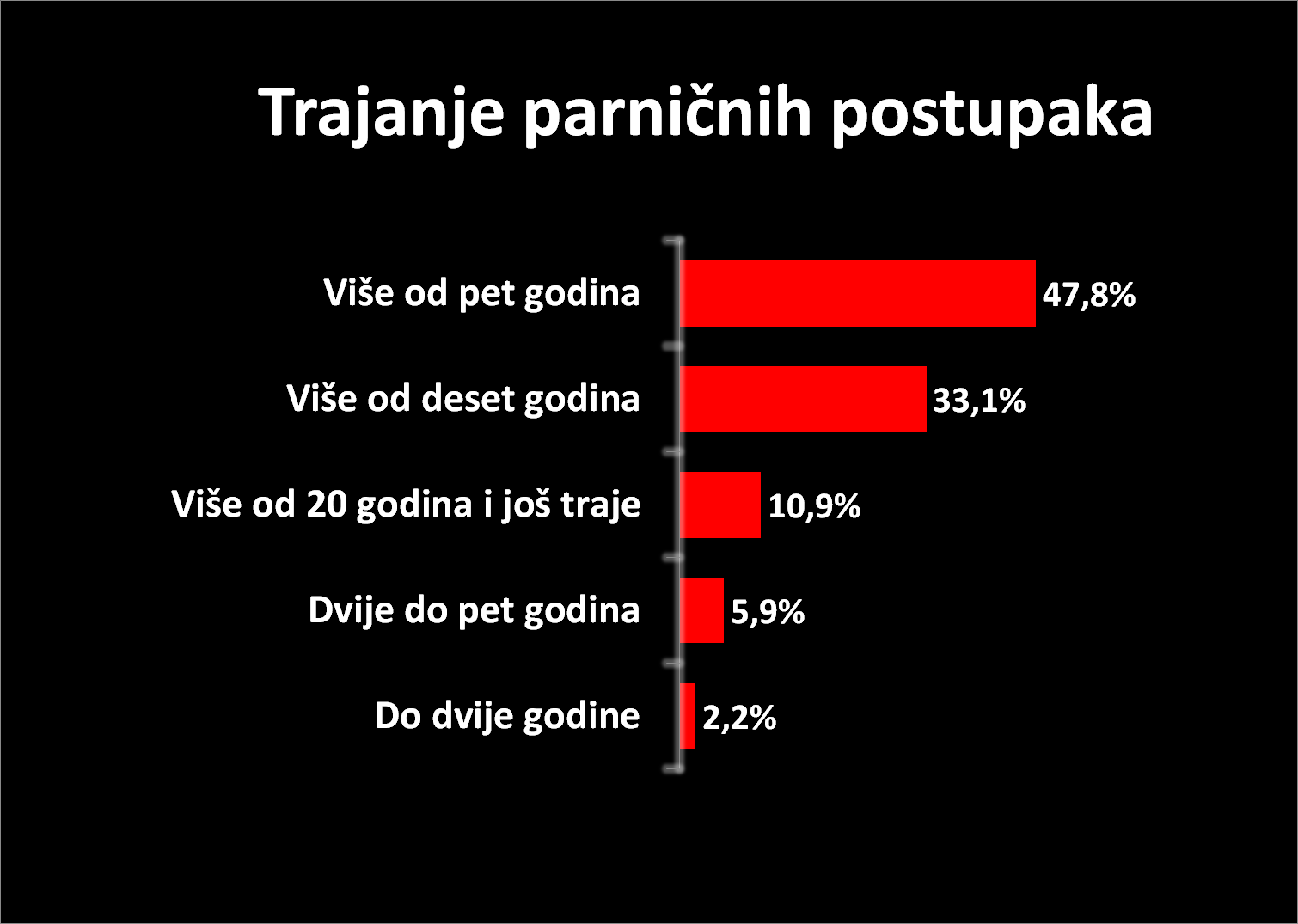
Part of the reason for the great disappointment in the justice system is probably due to the difference between expectations and the reality of the speed and effectiveness of the system. Answers to the question, "How long, in your opinion, can a court proceeding last?" For a reasonable timeline — up to 18 months, voted about 18% of respondents, while only about 1% of respondents agree that a reasonable time frame is over 18 months. The remaining approx. 80% think that the court proceedings should last less than 18 months — of which the most significant number, 54% of them, feel that they should last up to 6 months. Others suggest even shorter deadlines of no more than three months or only a month. From this data, we can see that there is almost no overlap between the periods that entrepreneurs consider necessary and what is happening in reality. There are only 2.2% of processes that last less than two years.
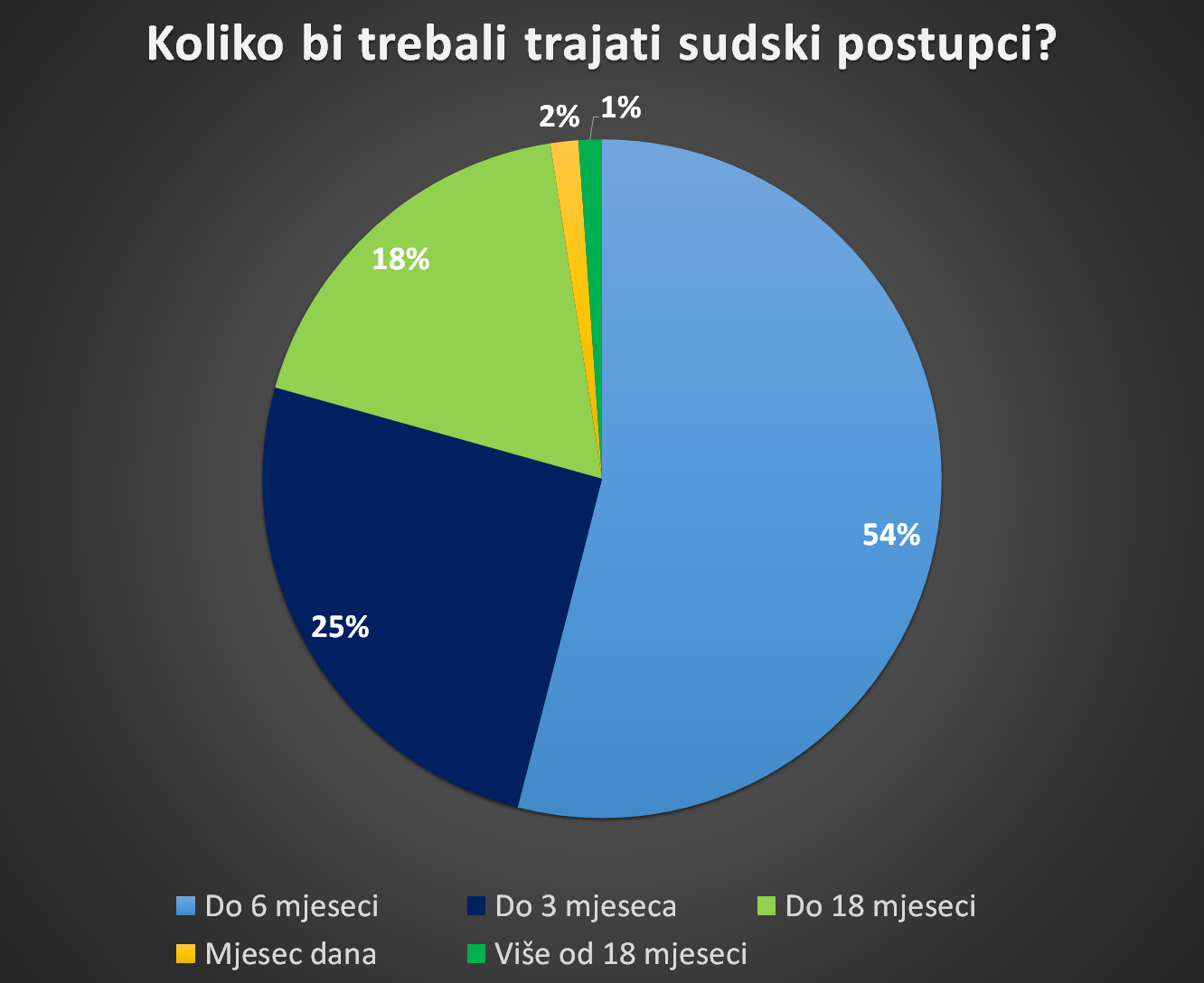
With the question, "What is the Croatian justice system's biggest problem?" we checked why the results are so bad. We got the following answers: Just under 11% think that the reason is a particular element — corruption. About 9% believe that the reason is general inefficiency, and over 3% believe the reasons are political pressures and the slowness that favors the legal framework. Interestingly, less than 2% of respondents added the lack of funds and ignorance, as the answers. We are left with the answer with the highest percentage of votes, more than 70%, which says that all of the above is the cause of the problem and that it makes no sense to single out something individually. According to previous results, a negligible 0.2% believe that there is no problem.
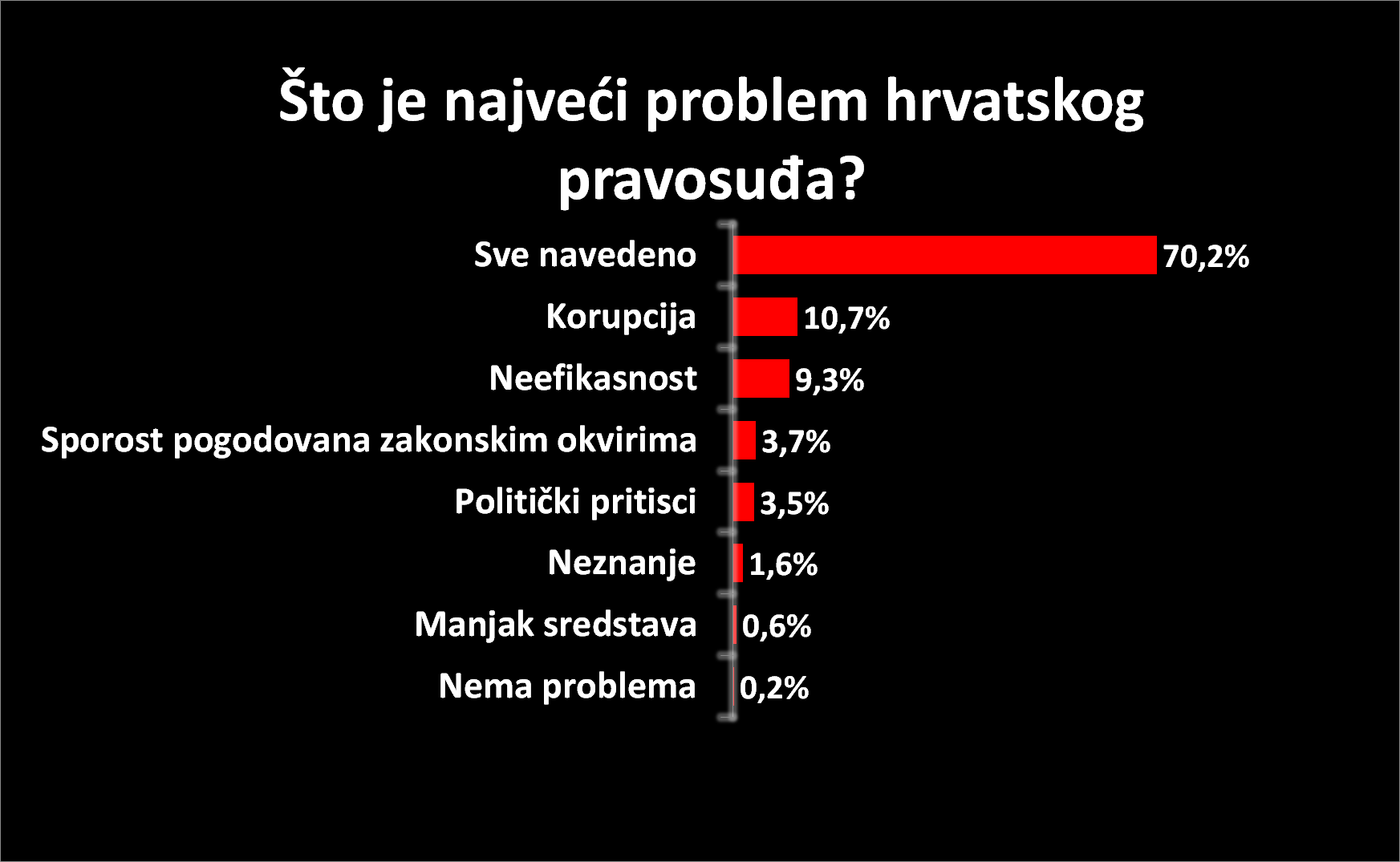
Additional information about a burning issue and what should be addressed first in some reforms, we got with the question, "What should be resolved first in the judicial system?"
Almost 61% of respondents believe that it is corruption. The second answer in size is speed, chosen by about 16% of respondents. About 12% of respondents think that all of the mentioned should be addressed along with many other things.
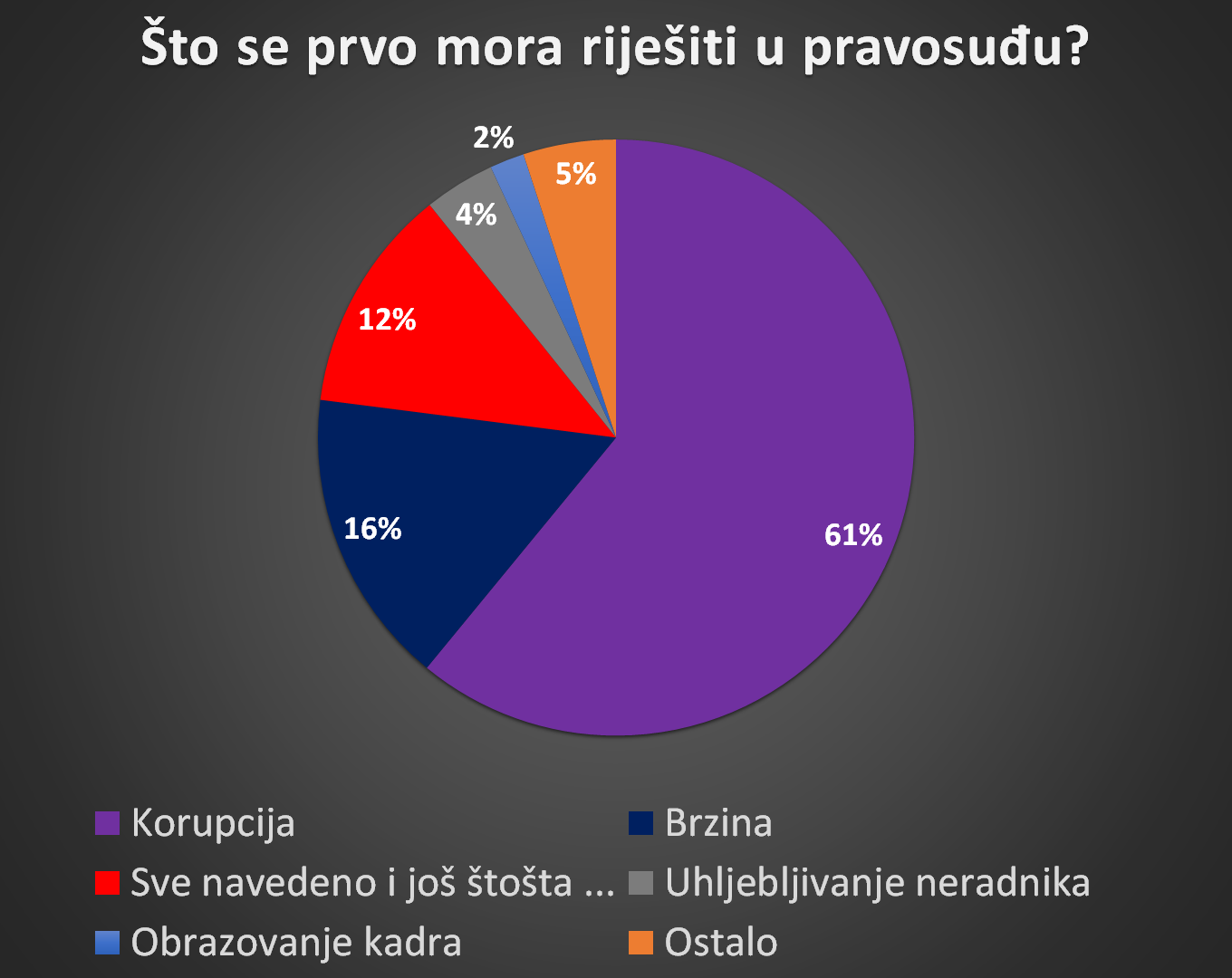
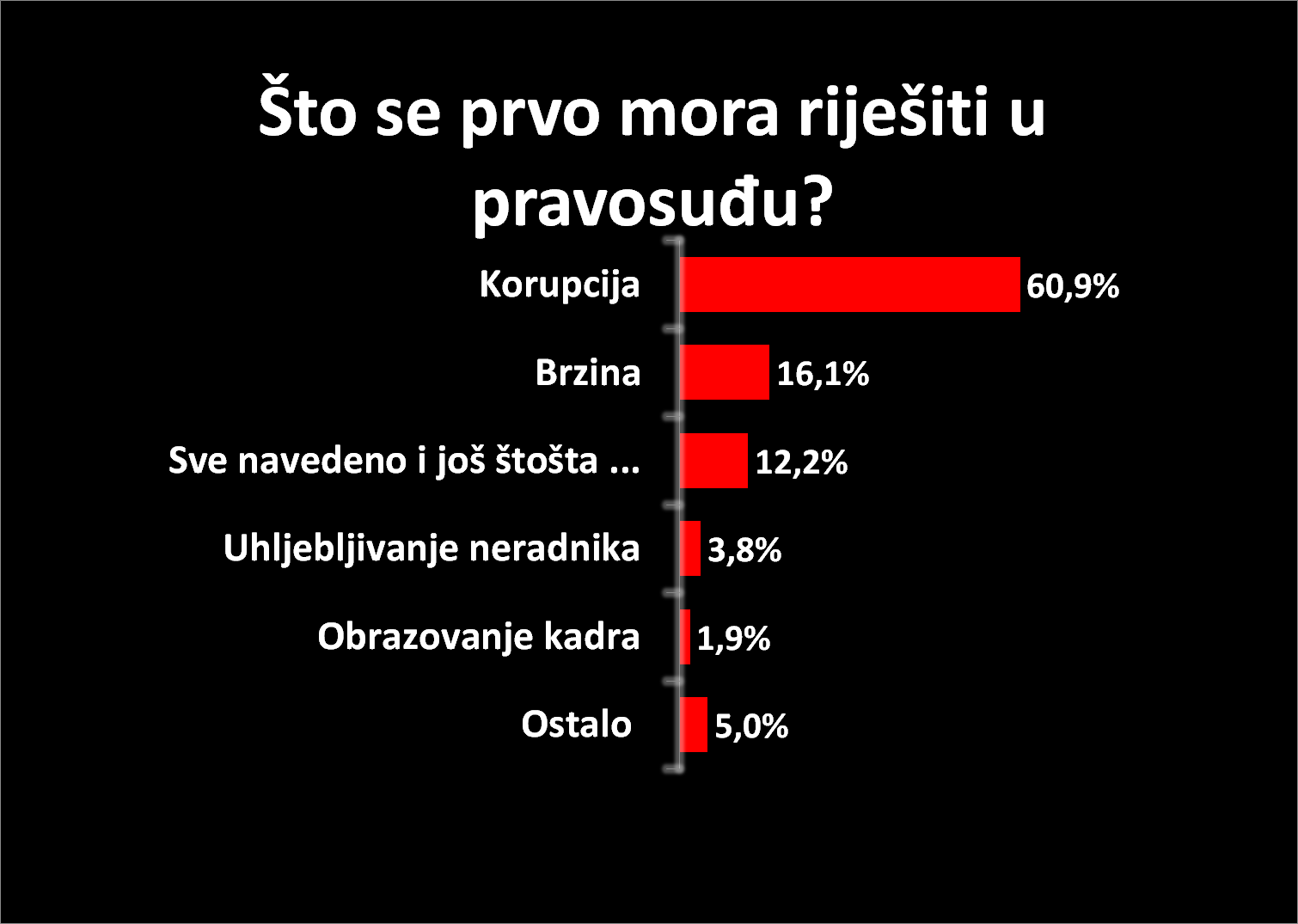
And the last part of the picture of Croatian justice is the perception of whether any changes are taking place. We asked our members if there are any reasons for hope and positivity, "How has the Croatian justice system been in the last few years?" We hoped to find at least the hints of a positive trend. Here are the answers: The most significant number of respondents — almost 58% believe that the condition is nearly as bad, and there are no changes. A great 39.5% believe that even this awful situation is not stable, but rather that things are getting worse and worse. Only 1.3% think that we are making progress, but not enough. And alone again, negligible 0.2% believe that the justice system is getting better and more effective.
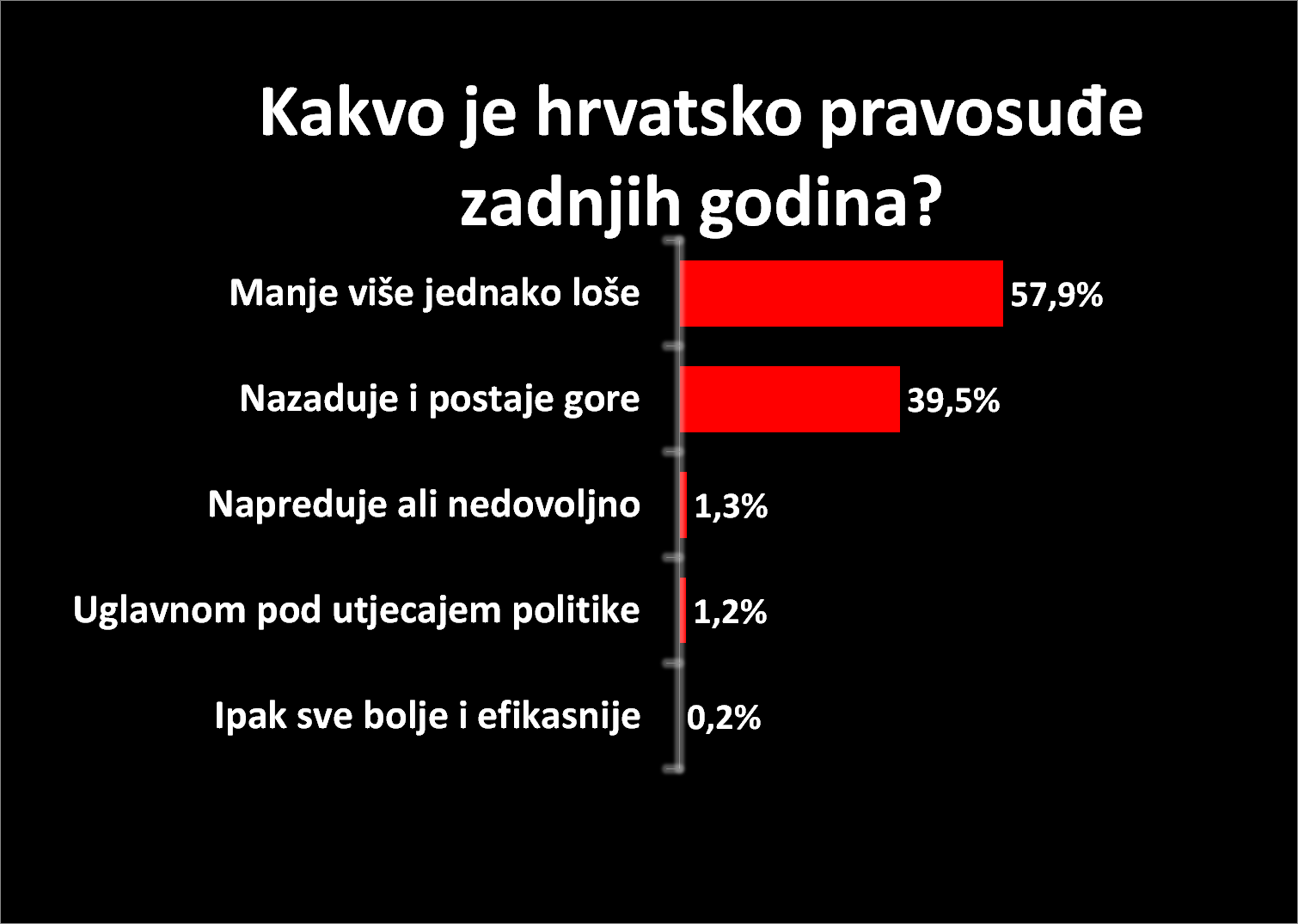
The conclusion is that Croatian entrepreneurs, who barely survive anyway, have very little confidence that the judicial system will help them professionally, objectively, and effectively. Given the speed of activities in the business world, the slowness of the legal system is catastrophic, and fewer people are counting on it. The main problem is corruption, more precisely the perception of corruption in the justice system, and hopelessness because things do not improve, and even go backward from year to year. The examples we got when doing surveys are numerous, and many of them sound unbelievable. For all these reasons, it is clear how the Glas poduzetnika Association will advocate for significant reforms and changes in the judicial system's work. Without it, as an integral part of the reforms that we demand, it will not be possible to ensure prosperity in the state because we want to see Croatia 2.0 as soon as possible!
"Justice system as the gangrene of the Croatia society is a phrase that has been used in the public space ever since the foundation of Independent Croatia. It's been used so much that it has lost its force at the same time, but unfortunately not the meaning and truthfulness.
By everything we've been served for many years, it appears that justice reform is an impossible mission, and the goal may not be easily achievable, but it is feasible. Many states we try to look upon achieved it before us. That cannot be done without a clear plan, decisions, and deadlines for their implementation, which would lead us to open the same subjects on some future elections again. UGP will closely monitor the politicians' work and their public actions to influence the judicial system to stop being mentioned in a negative context." said Hrvoje Bujas, president of the Glas Poduzetnika Association.
The Glas Poduzetnika Association: Holidays In Croatia Are Safe!
June 25 - Croatian tourism and hospitality professionals, and entrepreneurs decided to react affirmatively and send out a positive message.
This years' tourist season is the main subject of headlines, but not for good things. Lapses in the organization of the tennis tournament in Zadar, without adhering to the recommended protective measures endangered the little that we had of this season we hoped for after the first news regarding the participants who tested positive came out. Unfortunately, after the news about tennis players who tested positive for coronavirus ravaged all the world's media and caused a very negative reaction to the epidemiological situation in Croatia, there was no timely response from the Ministry of Tourism and Croatian Tourist Board, as well as any form of communication with potential guests from abroad and putting out the media fire. Glas Poduzetnika Association asks for the Government’s full focus and readiness to manage the crisis. We have repeatedly warned that the elections were called at a completely inappropriate time, and this statement becomes more accurate every day.
The Glas Poduzetnika Association gathers many entrepreneurs from the tourism, hospitality, and all accompanying fields and activities. We will do everything in our power to save the tourist season and the existence of our employees. Some EU states, such as Slovenia and Austria, have already announced the possibility of re-closing borders with Croatia. Many of the reservations that tourist workers have been fighting for in recent months were canceled overnight. That has done significant damage to tourism and the economy.
"We make an extraordinary effort in our hospitality establishments and accommodation units for our guests to enjoy a superior holiday experience in Croatia, our food, culture, and the beauty of nature. Our employees and we do our best to offer our guests the highest quality service and safety, respecting all measures of disinfection, distancing, and using the prescribed protective equipment. Croatia must be open, but it must also be safe, and we take care of that every day." said Gordana Fabijanić, owner of the famous tavern "Didova Kuća" on the island of Pag, one of the recommended restaurants in the renowned Gault & Millau guidebook for many years. Gordana is also a member of the UGP's Hospitality and Tourism Committee.
More than 200,000 tourists have had the opportunity to make sure of the superior professionalism of Croatian tourist and hospitality professionals on Adriatic in the past days. Due to all of that, our members, tourism and hospitality professionals, decided to send a message to local and foreign tourists: "Croatia is safe, we are professionals, and we adhere to the given recommendations!"
"We want to send a message to all the media in the world, and Croatia, that Croatian tourism workers and hospitality professionals adhere to the recommendations and regulations related to preventing the spread of the coronavirus disease. We invite all tourists to come to Croatia and EU States not to close borders with Croatia. We are serious and professional." stressed Vedran Jakominić. member of the UGP's Hospitality and Tourism Committee.
We in the Glas Poduzetnika Association and our members are still optimistic. We believe that #CroatiaCan save the season, preserve the health of its citizens and guests, provide hospitality for all and go ahead! Holidays in Croatia are safe because hospitality and tourism professionals are responsible, and we wish for all the world to know that with the slogan #CroatiaIsSafe.
Hardworking entrepreneurs and workers cannot do this alone. The intentions during the organization of the tournament in Zadar were good, and the goal was the promotion of Croatia in a positive light. Still, unfortunately, lapses were made, and the media effect was just the opposite. Blaming the organizers and the Civil Protection Committee will not lead us to anything or repair the damage. Mistakes happen, and we learn from them, we must look forward and make sure not to make similar mistakes in the future. We have to be open and minimize the risk. We hope that the Government and the Civil Protection Committee will learn something from this, that they will be more critical to their work and mistakes, and that they will sincerely apologize to the entrepreneurs for the damage they unintentionally caused with this situation. We believe that they will behave more responsibly in the future and be up to the task and help the tourism and economy.
***
The GLAS PODUZETNIKA Initiative started as a citizens' self-organized group, most of which are small entrepreneurs, after the announcement of the first set of Government's measures, which the organizers deemed insufficient. The Initiative assembled more than 100,000 entrepreneurs, small business owners, self-employed, and the employees in the private sector in less than 15 days, drawing the media spotlight with its uncompromising requests and appearances. Considering this, GLAS PODUZETNIKA positioned itself as a relevant factor in public discussions aimed to determine Croatia's new economic direction. Its position was also confirmed by the Government of the Republic of Croatia, has included some of the Initiative's suggestions in the second set of economic measures, thus confirming Initiative's undeniable influence. At the request of the Initiative's members, the GLAS PODUZETNIKA Association was established gathering more than 12,000 members. More than 200,000 Croatian citizens support the Association.
For the latest on the Glas Poduzetnika initiative, follow the dedicated TCN section.
'Voice of Entrepreneurs' Say Croatian Govt Discriminates against Micro-Businesses
ZAGREB, June 21, 2020 - The Voice of Entrepreneurs association on Sunday criticised the government for unacceptable ommissions in its regulations on further state aid for businesses affected by the coronavirus crisis.
The association said destination retail had been included in the government's aid measures for June owing to its insistence, however, state aid referred only to companies with up to ten employees.
On the other hand, the measure envisaging shorter working hours refers only to those employers who have more than ten employees, the association said, noting that this way many businesses were discriminated against.
It said that the government seemed to be adopting across-the-board measures, without defining specific measures for micro businesses which account for as much as 50% of all businesses and all workers in the country.
"We believe that all businesses with up to ten employees should be entitled to jobkeeping support if their turnover has dropped by more than 50%," the association said.
Big Data Shows Merging Municipalities Could Save Croatia 1.29 Billion Kuna a Year
June 21, 2020 - Croatia's bloated bureaucracy is not sustainable. Glas Poduzetnika data scientist Nikola Strahija uses big data to show how merging municipalities can save 1.29 BILLION kuna (170 million euro) a year.
When I first moved to Hvar back in 2002, I was surprised to learn that my new hometown of Jelsa had its own mayor and tourist board director. There were only 1,750 people in the entire municipality to administer. I was even more surprised to then learn that this beautiful island of 11,000 permanent residents had no less than FOUR mayors and FIVE tourist board directors, each with its own administrative support team.
That is a LOT of public sector workers.
Who were not that efficient, or interested in being efficient. I will never forget one tourist many years ago at the Jelsa Tourist Board office asking what there was to do in Stari Grad, as he was considering a bus trip the next day.
"The bus leaves at these times (points to bus schedule) and the Stari Grad Tourist Board is close to the bus station. They can tell you everything about Stari Grad."
Back then, I was naive and knew nothing of Uhljebistan, the nepotism and jobs for the cousins, their families and other voters, to perpetuate the corrupt status quo. If we merged all these administrations into one, how much more efficient would we be, and how much money could we then invest in building a better country?
About 1.29 billion kuna a year (170 million euro) seems to be the answer.
Some 18 years after my arrival, the Mighty State of Uhljebistan is facing a twin virus attack from the Terrible Twins - Transparency and Technology. Corona has laid bare many of the system's failings, and now the Terrible Twins will expose the truth in minute detail.
It was a real pleasure to have only my third Zoom chat ever yesterday, this time with Glas Poduzetnika data scientist, Nikola Strahija, who has compiled some quite phenomenal research using machine learning and other clever stuff I don't really understand.
Meet the municipality which spends 72% of its budget on salaries, with 82% of its budget coming from government assistance (no, I had never of the place either), just one of the many gems Nikola's research unearthed. In the words of Glas Poduzetnika (UGP - Voice of Entrepreneurs):
The analysis of UGP data scientist Nikola Strahija revealed facts that the Croatian Government has not been able to present to citizens for years.
By abolishing unsustainable local self-government units, Croatia can save at least one billion kuna a year.
A member of the UGP, data scientist Nikola Strahija, came up with astonishing data using machine learning - abolishing the financially unsustainable 430 units of local self-government would save at least one billion kuna a year.
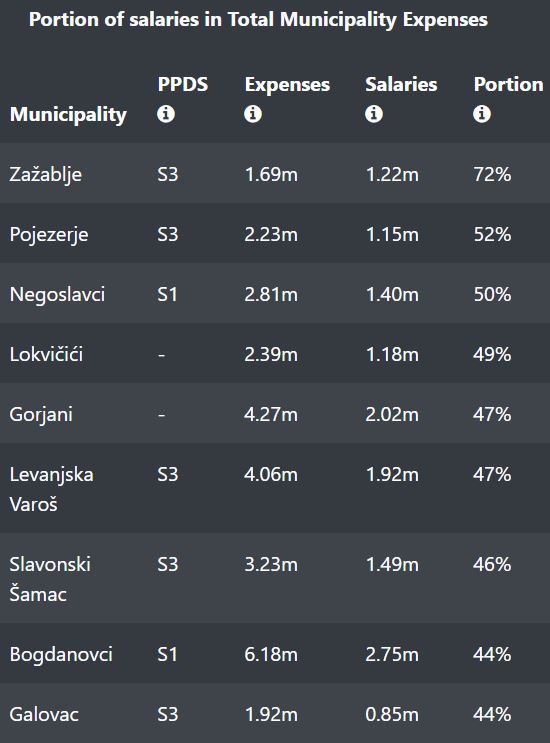
Over the last ten years, the cumbersomeness of public administration and the addition of many local self-government units has been a frequent topic. It was again actualized in the coronavirus crisis, when on daily examples, all the absurdity of the division of local self-government units came to the fore. It has become apparent that some of them do not even have the basic things that residents need on a daily basis, and yet they have their own municipality and mayor. Also, there is even an example of a settlement located in two municipalities. Croatia has over 100 units that cannot function without state aid. By merging them, great savings can be made, and these funds can be redirected to many places and projects.
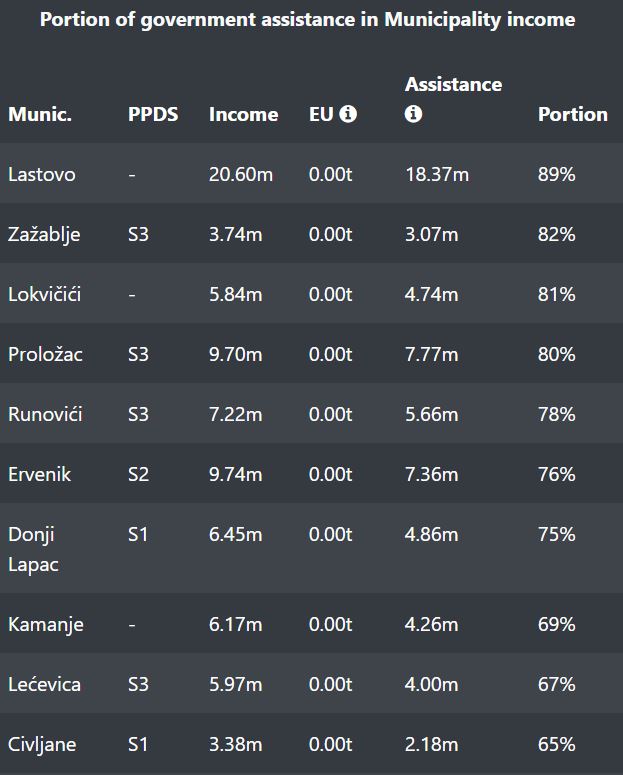
Due to all the above, a member of the association Voice of Entrepreneurs Nikola Strahija decided to make a map of the optimal territorial organization of local self-government units. He did this using machine learning, and used the geolocation and financial reports for 2018 as the basis of logic.
The result is approximately 430 fewer local units and about a billion kuna in savings per year.
Clicking on the new, proposed self-government unit displays all merged units and financial indicators, such as cost per capita before and after, expenditure before and after, total salaries, total benefits paid to citizens, etc.
The map goes into incredible detail with financials and showing which municipalities are not sustainable and should be merged. Have a wander around the map here.
A phenomenal piece of work, young man, and I look forward to working with you on the project we discussed yesterday.
For the latest from Glas Poduzetnika, check out the dedicated TCN section.
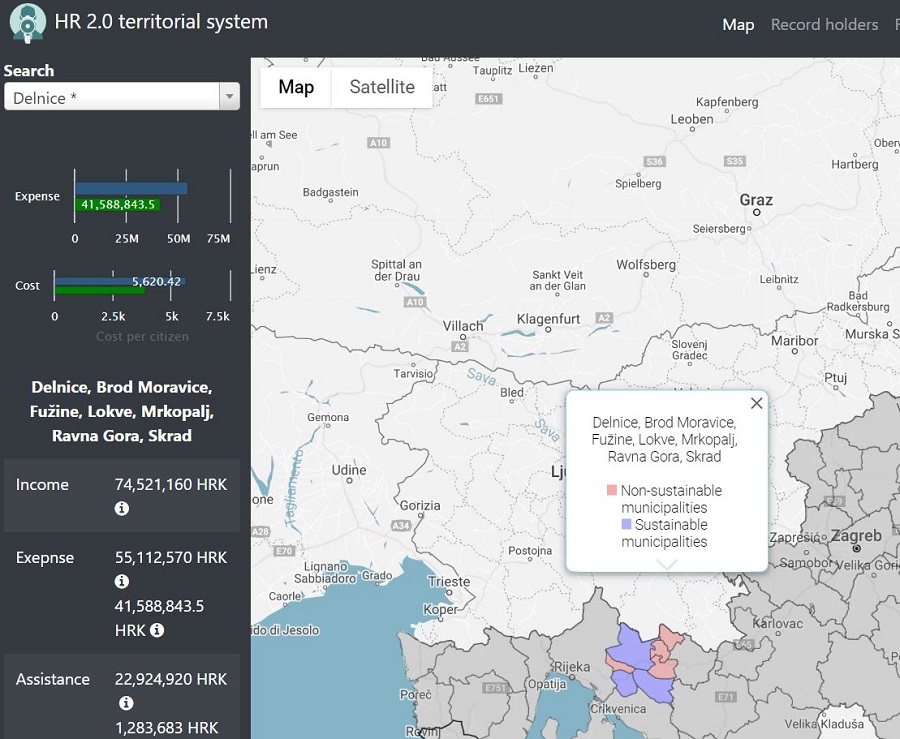
GP Pulse: Elections 2020 – Entrepreneurial Spring
June 17, 2020 - Will entrepreneurs finally have a decisive influence on the election results?
It is only a few weeks until the new parliamentary elections. UGP's attitude was clear. We thought that, just like most entrepreneurs, elections were scheduled too early. Political structures were focused on them, not at solving one of the world's largest health and economic crisis. We are afraid that politicians again looked only at their interests and calculated what's most cost-effective for them, instead of demonstrating state potential and solving general social importance issues, for which they received a mandate and for which they are paid.
We have already written about who entrepreneurs are (especially small, micro, and medium-sized ones), and we were also interested in what actions motivated them.
Given the massive influence through the media, both among the general population and among entrepreneurs, who significantly homogenized, we investigated their attitude to politics and elections through several surveys. Many of the data (as we will see) indicate that entrepreneurs (especially micro, small and medium-sized, and self-employed and small business owners, most of whom are in UGP) are awaking as a group. They are becoming more aware of their untapped potential, which is starting to focalize for the overall well-being of society.
First, it would be nice to note the perception of under what conditions, or better, in what "climate" do Croatian entrepreneurs work? To the question – What is the extent of (anti-)entrepreneurial climate in Croatia? We got these answers: almost 90% believe that the climate in Croatia is anti-entrepreneurial and that entrepreneurs are being harassed and discouraged. This number is supported by nearly 8% who think that the climate is somewhat anti-entrepreneurial and makes it difficult for entrepreneurs to work. It is worth noting that no one believed that the climate in Croatia is good for entrepreneurs.


Given this situation, a logical question arises: What do entrepreneurs plan to do to change this? Of course, there are many options, one of which is registering with UGP, which many have used. We were interested in direct action in the upcoming elections, so we asked them: Will you give preferential votes to listed entrepreneurs in the forthcoming elections? The answers were pretty clear: 84% said they would vote for entrepreneurs who are on the lists. Only 7% said that it did not matter to them, and highly interestingly, only 2.6% said that they would not go to the polls.
This information is exciting because there were only a few entrepreneurs in the last convocation of the Parliament, and that there is a need to improve the representation of business interests. Also, such information can lead to a preponderance both in the formation of the lists of individual parties and coalitions, if they want to maximize the votes of their voters.
This motivation was additionally confirmed with the question: For whom, in your opinion, is it essential to be in the new convocation of the Parliament? More than 41% of entrepreneurs said they believe that an entrepreneur should be in Parliament, while options such as doctors, academics, or musicians did not get too many votes. Almost 40% of people said that specialists should be in Parliament and another 13% only that it would be enough if they were righteous, no matter who they are.

Of course, desires are one thing, and what someone is willing to do another. The relationship between attitude and behavior is not always as simple as one would think. So far, there are also very few entrepreneurs who actively participated in politics and took higher positions. Given the desire for better representation and willingness to vote for entrepreneurs, we asked them – Are you ready to appear on the electoral lists of any party? More than 46% gave the expected answer – No, not getting close to politics. There is 37% of those who understand and appreciate the effort of those who went on this adventure saying: I am not, but I support those who dare to enter the political arena. And very interestingly, I believe more than ever – up to 13% of respondents said that they are considering this option or that they would be politically activated if they find the right choice.


According to information that UGP has, there has already been a shift in the number of active entrepreneurs that will be found on the lists of parties across the political spectrum. Opportunities are being created, and the potential for change and the goal defined by UGP as Croatia 2.0 is growing. We asked our members for even better results: What else would motivate you to go to the polls? The responses correspond to information from previous surveys. More than 33% say that they go to the polls regularly, and another 30% say that this time they are participating for sure, even if that wasn't the case before. About 25% report that they are motivated by the party's support for UGP requirements. As a reminder, UGP Pledge was sent to all major parties, having received the answers and support from almost all of them except HDZ (no response) and SDP (they agree only with some requirements). Another 5% say that they would like to see more entrepreneurs on the electoral lists and that, in this way, different parties can motivate them.

Of course, even though UGP has repeatedly stated that it does not want to enter politics or engage as a party, it follows both the campaign promises and the statements of all active stakeholders. In election time, as they have every time so far, the parties have flippantly started pouncing on various figures and plans, such as the number of new jobs, or an increase in the minimum wage. That only showed that they are not interested, nor do they understand the economic context, but rather are trying to collect the cheapest political points. How many of them can be obtained from entrepreneurs, we checked with these questions: Do you think that the current governing coalition has fulfilled all its (old) campaign promises? The answers are clear, more than 90% believe they didn't fulfill anything, and only 5% favorably say they completed as much as they could. More than 2% hold that someone who dares to make such statements should be immediately disqualified from further discussion.

Entrepreneurial memory goes back four years and shows evident dissatisfaction with the current leadership of the state. But we also wanted to see how much they trust the new promises of the currently opposed parties, which are not far behind the well-known rhetoric. We asked another question: How much do you think the Restart coalition (SDP and others) will fulfill their campaign promises? The answers are similar, as in the previous question: almost 75% say that those are all empty stories. Another 16% have a good memory and says that they had their opportunity and haven't used it. And only 4% think they can make a difference.

And with that, the circle is closed. More than 90% of entrepreneurs do not believe in either the governing or the opposition party. On the other hand, so far, they have been quite active in voting. With the pressure from a crisis and struggle for survival, they are even more motivated, including those who have remained passive until now, who will go to the polls this time. The motive, in addition to the short-term catastrophic situation, is the medium-term goal of changing the unbearable anti-entrepreneurial climate in the country, through changes requested by UGP directly and through its postulates. It's time for more entrepreneurs to enter Parliament so their voice can be heard louder. The drive for more entrepreneurs follows a growing number of those who are willing to run, as well as creating a new level of awareness in the private sector that will increasingly value the entrepreneurs who enter politics and leave aside projects and firms to which they often have dedicated their entire lives. In this election, everyone will have an extra compass in mind with UGP Pledge and responses from all parties to our very logical and clear requirements that are needed to make changes for Croatia 2.0. If we want to escape from the rear end of Europe, the awakening of entrepreneurs, their connection, and collective political actions can and must be more powerful and decisive with each new election. After the parliamentary elections, where it will soon be seen who really supported the UGP requirements and who did so only on paper, come the equally important, if not, even more, local elections. There will be opportunities to reward and punish according to the merits promptly. In each case, one thing is clear: through the activities of the Glas Poduzetnika Association, entrepreneurs and their employees come together and concretize their views... The Force awakens.
Milanovic Meets With Delegation of Voice of Entrepreneurs Association
ZAGREB, June 16, 2020 - President Zoran Milanovic on Tuesday received a delegation of the Voice of Entrepreneurs association who informed him of its activities and objectives, the president's office said in a press release.

During the meeting, the association's representatives said that they established the association as a response to the government's measures during the coronavirus pandemic and that now they are continuing to act as the voice of micro, small and medium-sized enterprises, trades and their employees, the press release said.

The delegation said that the association's motto is more work and justice, lower taxes, and absolute transparency and that they wished to be the driver of change aimed at creating a better and wealthier society in Croatia.

The delegation was headed by Voice of Entrepreneurs president Hrvoje Bujas, its executive director Drazen Orescanin, coordinator Marusa Stamac, and economic analyst Vuk Vukovic, the press release said.
GP Puls 66: What Is The Reason Behind The Recent Arrests Of Public Service Employees?
June 1, 2020 - Recently, we have witnessed a series of arrests of high-ranking government officials and heads of state-owned firms. UGP fully supports any fight against corruption and strives for better functioning of the judicial system and greater justice. Given the interesting timing of these arrests, we asked our members: What you think about the recent arrests of people from state structures?
These are their answers:
Most respondents—almost 73% believe that this is a pre-election play that will not have any real consequences for the accused. Another 19% also believe that such actions are useless because no one is ever convicted. In the third category, 5% think that this is an internal clash within the ruling party, while 1.8% believe that the conviction is questionable, but the stolen money will certainly not be returned. Only 1.2% of respondents give a somewhat passing grade and think it's not bad that it started, but they are also not sure whether there will be any convictions. And a whopping 0.1% believe that the system is doing its job independently and that such steps are excellent.

Given these results, we must conclude that if this is part of the election campaign, it will not have the desired reactions from entrepreneurs. Although corruption is one of the main topics, it is clear to everyone that the consequences for the accused are rare. In a country where corrupt officials' arrests occur with the same frequency as the Olympic Games or some World Championships, every four years and, interestingly, coincide with parliamentary elections, the positive impact of such actions is significantly reduced. Glas Poduzetnika Association certainly intends to monitor the situation and insist on concrete results and condemnations, not just performing plays that can be used to collect short-term political points.
Stereotypes and Prejudices: Who are Croatian Entrepreneurs, "Really"?
May 15, 2020 - The topic of Croatian entrepreneurs and their negative public perception in a part of the public is a part of a broader history of the private sector in a transition country. Various economic, psychological, and social aspects are mixed, and partially the influence of ideologically formed stereotypes. However, it seems that the perception created over a long time, through anecdotal evidence and the actions of interest groups, is far from reality. Now, perhaps, the turn of events is such that it will clear up many misconceptions and put more accurate information in the foreground.
Of course, on one side, and a global scale, we are seeing growing inequality and differences between rich and poor, and individuals and countries. Using resources without taking into account their limitations, or the ecosystem and the effects it has on it, has rightfully homogenized various groups of people and turned them into activists. What happens in our country, which has not yet mentally left behind the communist legacy and its bad aspects? Although we nominally live in a capitalist system, socialism still runs through many segments of society. And there, perhaps, we should open the topic of Croatian micro, small and medium-sized entrepreneurs, sole proprietors, and self-employed to ask ourselves: Who are these people?
Someone who watches the newspaper headlines from the side, first associations often take them to a dark period of privatization of state-owned firms and politically connected people who have become rich. They can think of tycoons and their arrogant sons, golden youth, and ruthless teenagers who drive expensive cars and kill people in car accidents. And, of course, they do not bear any consequences due to the power and influence of their parents, which can affect the obviously corrupt Croatian judicial proceedings (we have the lowest level of confidence in the judicial system in the EU).
But who are the REAL ENTREPRENEURS, and who cares about them?
Unions protect their employees in the public sector, corporations through their PR departments and the strength of their brand, somewhat safeguard their employees, but who cares about the image of (small) entrepreneurs? It seems that no one has worked on that for many years and did not think that this is an important social issue?
Here is some analysis data. Let's start with how many of them are there. According to the aggregate data published by Fina each year, more than 98 percent of all Croatian companies are classified as micro and small enterprises. They employ more than 470,000 employees. As he cited in his 2016 article, Davor Huić—In the first five years of the first crisis (2009–2013), small companies revoked 30 thousand job posts (they sent 30,000 people to the labor exchange). The return on capital was not positive in any of the observed years, and in 2010 it was in the red a whopping 4.3 percent. At the same time, the debt index rose from 3.6 to 4.3—on each kuna of equity capital, they have almost four and a half kuna of debt (in "normal" conditions, this ratio should be 1:2). In other words, entrepreneurs during the previous crisis (2009–2013) owed everything they had—their apartments, houses, countries, cars, so that their companies would survive, and to keep their "profitable business" alive—the one that brings them losses. That and many other indicators already then showed that Croatian entrepreneurship was on its knees and in danger of complete collapse—had our bureaucratic caste continued with radical anti-signature policies (perhaps additional charges that arose with the crisis), as it was at that time.
The percentage of the number of closed companies is also significant. Over the past couple of years, there has finally been a slight recovery from the last crisis—as seen from the number of newly employed to this segment—almost 46,000 people, but the situation is far from ideal.
According to the CEPOR report, more than 34% of businesses as a reason for closing say that they cannot be profitable under these conditions, and another 15% are closing for problems with the access to financing.
We can only guess how notable this number will be after the first stage of the current crisis.
The Glas Poduzetnika Association unites more than 10,000 micro, small and medium-sized entrepreneurs and self-employed, sole proprietors, subject to lump-sum taxation, sole proprietors, and OPGs (family farms). We had a good opportunity to gather additional information about who are Croatian entrepreneurs and what state they are in, through surveys that involved thousands of participants. They gave their answers (and not anonymously, but with their first and last names). Here is a summary of some of the results:
In contrast to the imputations of some union representatives that entrepreneurs are riding in expensive cars, our members are uncomfortable admitting that they do have a minimal stock of capital in reserve.
More than 80% of companies have less than 20,000 kn, and almost 60% have less than 5,000 kn. That is directly reflected in the assessment of the survival of their companies in times of crisis or unpredictability when more than 90% of members say that they can withstand a maximum of 3 months (and for 50% of them it's only a month).
Also, about 60% of them live as tenants or pay off loans on the property they live in or live with their parents/in the family property. Only 23% own an official company-owned car, and 57% must use their private vehicle.
Unfortunately, some of them will, if they can't keep their companies alive, consider leaving the country and finding happiness elsewhere (about 20%). It would be interesting to see how many employees from the public sector with secure salaries have left the country or are planning to leave (given that they are reportedly treated very poorly). The situation is generally not very good when they cannot expect support and loans from banks, those in the tourism industry have already reported considerable changes in bookings, and about 80% of them cannot work from home or can only partially.
Another picture that is continually being sent out is that entrepreneurs are using their workers and that they live of unfair exploitation of their work. If we take individual cases, each thesis is easy to prove, but let's look again at some statistics on which we can make a better generalization and conclusions.
About 40% of entrepreneurs in their small businesses employ family members or relatives. A certain number also hire their friends. It is hard to imagine that such social relationships would survive if employees were deceived and exploited.
Only about a quarter of these entrepreneurs is not in debt, and 30% of them are in the average or significant debts. Another 43% of them risked for the business and invested all their personal assets. This is also explained by the data showing that entrepreneurs work the most because they have to fight not to lose everything they have. Only 6% of them work 8 hours per day, which is usual for the public sector and according to the law. The majority of them, 44%, works 10 to 12 hours per day, and an additional 29% except working overtime during the week, they also work weekends. Alarming 14% has to work over 12 h a day.
What position does all this put Croatian entrepreneurs in? They risk everything they have, work a lot, are under constant pressure from the repressive inspection, the Croatian justice system will practically not help them because of their slowness and inefficiency. They are almost stigmatized by part of the public, and if they manage to survive all the administrative and other obstacles set by the state, and finally, if they get into the right business model and stay alive after fighting competition and ultimately succeed, what exactly have they achieved? The companies that do not perish, but continue to do business, get a completely different level of profit—from moderate to medium, depending on the industry. It is clear that the vast majority survive and do not accumulate great wealth with their work (which would be fine and is in Western countries). Instead, they survive and work to replenish the state Treasury. Perhaps the best word for Croatian entrepreneurs would be—workingmen, the real working class, not some caste that is put in opposition to the workers.
In this situation, who would even want to look for work in the private sector and as an entrepreneur? The chances of success are insignificant compared to the risk. Feeding off the state offers safety, comfortable and predictive job, insured for years to come. Because of this, the increasing numbers of surveys showing that young people, instead of wanting to be creative, innovate and create new business ideas thus creating additional value, and thrive in a fierce market struggle, are increasingly choosing and wanting peaceful and safe but often meaningless positions in the state administration, even though they will lose opportunities for personal advancement and growth, are not surprising. Where does this put us as a country that will, despite its good potential (Croatia is, say, no. 37 on the WEF Global Human Capital Report), find it increasingly difficult to compete in the global market, and continue to lag behind all relevant factors (Doing Business Report, WEF Global Competitiveness Report), is not difficult to predict. Borrowing is not indefinitely possible, and the public sector is financed from a budget that is filled mainly by the private sector. When it collapses, the only question is which of the black scenarios awaits us. As told in an interview with the Financial Times, a member of the wealthiest Swedish family—Jacob Wallenberg, who himself is "deathly" afraid of the consequences for society if the unemployment rate gets close to 30% (and employees of the private sector are out of work in a swoop), and the economy itself will contract accordingly. He believes that in this case, "There will be no recovery. There will be social unrest. There will be violence. There will be socioeconomic consequences—dramatic unemployment."—Why? Because the private sector will collapse. It is crucial to think carefully before one starts throwing dirt on entrepreneurs, and short-sightedly protect only their own short-term interests.
Aco Momcilovic
UGP
For the Croatian version of the article, click here.
For the latest from the Glas Poduzetnika initiative, follow the dedicated TCN section.
You can also join the 55,000+ people in the Glas Poduzetnika Facebook group.


